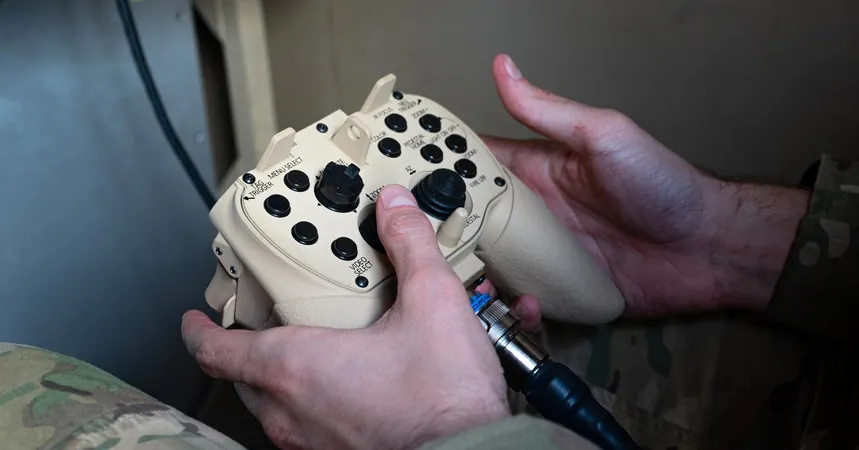
How the US Military is Shifting to Video Game Controllers for Warfare
2024-10-04
How the US Military is Shifting to Video Game Controllers for Warfare
In an unprecedented pivot towards the future of warfare, the US military is ditching traditional control panels in favor of game controllers that look like they belong in a living room rather than a battlefield. Amid the technological arms race, American troops will soon wield the latest war machines using controls that many young adults are already familiar with thanks to their Xbox and PlayStation consoles.
The Defense Department has been integrating variants of the Freedom of Movement Control Unit (FMCU)—ruggedized game controller-like devices—across a range of new advanced weapon platforms, as indicated by recent images from the Defense Visual Information Distribution System. These systems are vital for military engagements, particularly in conflict scenarios such as the increasing tensions in the Indo-Pacific region and potential clashes with Russia.
Among the platforms adopting these controllers are the Navy's Marine Corps Expeditionary Ship Interdiction System (NMESIS), designed to launch precision anti-ship Naval Strike Missiles; the Army’s Maneuver-Short Range Air Defense (M-SHORAD), which is equipped with advanced missile systems and air defense capabilities; and innovative Air Force vehicles like the Recovery of Air Bases Denied by Ordnance (RADBO) truck, armed with a laser to disarm explosives. The Marine Corps is also testing laser weapons mounted on Humvees, which utilize these handsets for greater efficiency in battlefield operations.
Manufactured by Measurement Systems Inc. (MSI) since 2008, the FMCU stands out for its familiar layout and robust design, intended to endure harsh conditions. This hand unit has been necessary for various military programs, largely because of its intuitive interface that echoes commercial gaming controllers.
Notably, the FMCU isn't entirely new; it has been operational since 2010 in systems like the MQ-8 Fire Scout drone. Its recent surge in popularity marks a trend where operational controls are not only familiar but designed to resonate with a new generation of recruits, many of whom have grown up playing video games.
US military officials recognize the importance of this evolution. For instance, Air Force spokespeople highlighted that using a controller similar to those from popular gaming consoles makes the transition smooth for younger operators trained in the gaming world.
The military's embrace of video game-style controllers is not limited to the US; other countries are following suit. The British Army, for example, employs remote-controlled vehicles driven by game controllers, while reports suggest that Ukrainian forces are using PlayStation controllers to operate drones in real combat scenarios against Russian incursions.
The strategic decision to adopt these user-friendly, standardized devices has advantages that go beyond simple comfort. The tactile responses of commercial controllers offer significant operational benefits, such as immediate feedback and ergonomic design, which can enhance situational awareness. This is particularly significant in light of past incidents where the reliance on touchscreens resulted in operational biases and errors during critical moments.
As of 2024, around 61% of Americans engage in video gaming, and an impressive 85% of teenagers play games regularly. Thus, aligning military operations with the skills these individuals have developed through gaming creates a streamlined training process and a ready pool of technologically adept personnel for future conflicts.
While the Pentagon has confirmed applications of the FMCU in various weapon systems, the long-term scope of this integration remains uncertain. However, the trend indicates a steadfast commitment to modernizing military training and operations. The question remains whether future controllers will evolve further based on gaming trends—and whether they might soon leverage augmented or virtual reality technologies.
In the next phase of military advancements, if game controllers can be effectively integrated into more extensive systems, who knows? We might be keeping our fingers crossed for the next Mark Zuckerberg-designed virtual controller to rule the battlefield.
Are We Ready for Warfare 2.0?
As military strategies continue to adapt to technological advancements, one thing is for sure: the nexus between gaming and warfare may redefine our battlefield experiences in unimaginable ways. As the ancient wisdom goes, "Play to win!"

 Brasil (PT)
Brasil (PT)
 Canada (EN)
Canada (EN)
 Chile (ES)
Chile (ES)
 España (ES)
España (ES)
 France (FR)
France (FR)
 Hong Kong (EN)
Hong Kong (EN)
 Italia (IT)
Italia (IT)
 日本 (JA)
日本 (JA)
 Magyarország (HU)
Magyarország (HU)
 Norge (NO)
Norge (NO)
 Polska (PL)
Polska (PL)
 Schweiz (DE)
Schweiz (DE)
 Singapore (EN)
Singapore (EN)
 Sverige (SV)
Sverige (SV)
 Suomi (FI)
Suomi (FI)
 Türkiye (TR)
Türkiye (TR)